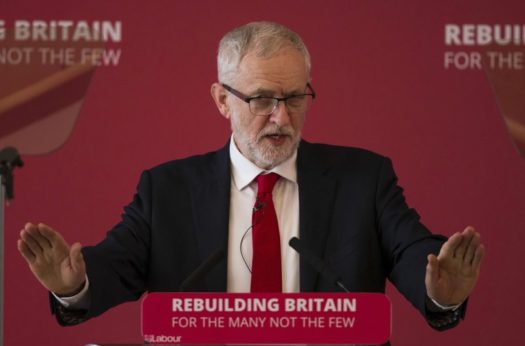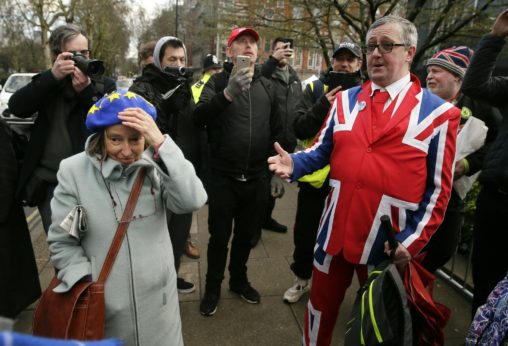
People’s World correspondent Al Neal is reporting from Europe during Britain’s scheduled departure from the European Union, due to take place March 29. His earlier coverage of Brexit is available here.
LONDON— The air was hot and stale inside the House of Commons. At 7:15 p.m., every cushioned green bench was packed tight with Members of Parliament.
Above the MPs’ chatter and jeers, the overcrowded public gallery was filled with U.K. voters and press sitting on the edge of their seats—a scene no different from a World Series game seven, tied at the top of the ninth inning.
After eight hours of debate, MPs cast their vote on British Prime Minister Theresa May’s eleventh-hour Brexit withdrawal agreement. Time slowed down as the results were tallied, and everyone sitting around me kept quietly asking, “What’s taking so long?”
Speaker of the House Jon Bercow finally rose from his seat, called the chamber into order, and read the results: “The ayes to the right 242, the noes to the left 391. The noes have it.”

Less than 24 hours after minor tweaks were successfully made, May’s Brexit deal was soundly rejected—again—tossing the U.K. into another crisis and derailing the entire U.K./European Union divorce process.
While last night’s 391 to 242 defeat was less than the record 230-vote loss May suffered in January—with only 81 MPs switching their vote, it leaves her premiership in jeopardy.
“May is now in a deep crisis, with Tory (Conservative) MPs and even some ministers speculating how long she can last in Downing Street,” said Mujtaba Rahman, managing director at Eurasia Group. “She will soldier on but is no longer in the driving seat on Brexit.”
A visibly exhausted May—who spent most of the afternoon sucking down throat lozenges—responded to her deal’s defeat in a gravelly voice: “I profoundly regret the decision that this House has taken tonight. I continue to believe that by far the best outcome is that the U.K. leaves the EU in an orderly fashion with a deal and that the deal we have negotiated is the best and indeed the only deal available.”
She outlined how the government would proceed, tabled a motion on whether the House of Commons supports leaving the EU without a deal March 29, and confirmed that Conservative MPs will have a free vote, instead of having to follow the party line, on the Brexit no-deal motion on Wednesday, March 13.
“Voting against leaving without a deal and for an extension does not solve the problems we face,” continued May. “This House will have to answer that question. Does it wish to revoke Article 50? Does it want to hold a second referendum? Or does it want to leave with a deal but not this deal? These are unenviable choices, but thanks to the decision the House has made this evening they must now be faced.”
The killing blow for May’s deal was delivered by U.K. Attorney General Geoffrey Cox.
In his published legal advice on the Brexit agreement reached late Monday, Cox, rather than endorsing the deal, took a dramatic turn and warned that the “legal risk” of the U.K. being trapped indefinitely by EU customs laws “remains unchanged,” despite the new Irish border backstop guarantees.
“The government has been defeated again by an enormous majority and it must accept its deal is clearly dead and does not have the support of this House. ‘No Deal’ must be taken off the table,” said Labour Party leader Jeremy Corbyn after the PM took her seat.
Corbyn continued:
“The House has got to come together with a proposal that could be negotiated. The Labour Party will put forward that proposal again. The Prime Minister is threatening us all with the danger of ‘No Deal,’ knowing full well the damage it will do to the British economy.”
He went on to call for a general election so the “people can choose who their government should be.”
Hours before the Brexit meaningful vote, Corbyn delivered a scathing rebuke of May, her Conservative government, and the “smoke and mirror” delay tactics.
“After three months of running down the clock, the Prime Minister has, despite extensive delays, achieved not a single change to the Withdrawal Agreement, not one single word has changed,” said Corbyn.
The EU’s chief Brexit negotiator, Michel Barnier, said of last night’s results, “The EU has done everything it can to help get the Withdrawal Agreement over the finish line…. The impasse can only be solved in the U.K. Our no-deal preparations are now more important than ever.”
EU Commission President Jean-Claude Juncker said “there will be no third chance” for the U.K. and any timeline extension would have to be agreed to by all 27 remaining EU nations and would end before EU elections in May.
What were the eleventh hour changes May secured?
While May was unable to get everything, she wanted—most notably the ability to unilaterally leave the Irish backstop arrangement, or a time limit for it—the legally binding joint statement goes as far as possible in repeating that the backstop is just a temporary insurance policy that keeps the U.K. in a customs union. And it gives the U.K. limited authority to walk away from it if the EU doesn’t do enough to replace the backstop with a full trade deal.
— Under the statement, the dispute settlement system reached in the original agreement, the independent arbitration panel, could rule the EU is acting in such a way as to make the backstop last indefinitely.
— Allows the U.K. or EU to “ultimately” have the right to enact a unilateral, proportionate suspension of its obligations under the Withdrawal Agreement, including the backstop. And the suspension would remain in place until the offending party has taken steps to comply with the arbitration panel’s ruling.
— A separate statement adding to the U.K./EU political declaration highlights the “need for alternative arrangements for the backstop” to be in place if no permanent deal is reached by Dec. 31, 2020.
The U.K. government also published a separate document interpreting the joint statement in its own words with consent from the EU.
Written in complicated legalese, the statement essentially says that if a free-trade agreement to replace the backstop isn’t concluded, nothing in the Withdrawal Agreement would prevent the U.K. from implementing measures which would remove the U.K. from its backstop obligations.
As I made my way out of the Palace of Westminster and onto St. Margaret Street, demonstrators from both sides of the Brexit debate crowded together, a look of shock mixed with resignation crossing their faces.

I headed off towards the Marquis of Granby pub with 30-year Green Party member and London activist Anthony Agius. As we walked past the Old Palace Yard, a truck blasting “We’re not going to take it” by Twisted Sister drove by with caricatures of pro-Brexit lawmakers attached to the back—a bullhorn changing the lyrics to: “We’re not going to fix it.”
We made our way inside the old Conservative haunt—the Marquis was the go-to spot for Conservative Party members before the party office moved from Smith Square. We ordered two Doom Bar bitter ales and sat down.
“Did you expect this outcome?” I asked.
“Yeah, it’s about what I was expecting,” Agius said. “Though I’m so tired of this whole thing that…I’m honestly indifferent at this point.”
We finished our pints quickly—after spending an hour or so making small talk about how similar U.K./U.S. politics had become, shook hands, and took our separate ways home—wondering what tomorrow in Parliament would bring.
Indifference, apathy, anger, and a lack of support by British voters will follow lawmakers closely as the political mess that is Brexit continues.
Today, MPs will vote on a ‘no-deal’ Brexit. If a no-deal Brexit is rejected, MPs will vote on a Brexit timeline extension (Article 50) on Thursday, March 14. If a no-deal withdrawal is accepted, the U.K. will stumble out of the EU blindfolded but on schedule at the end of March.
For now, the future of a U.K. withdrawal will be determined by each day’s vote results.
All we can do is watch and wait.










